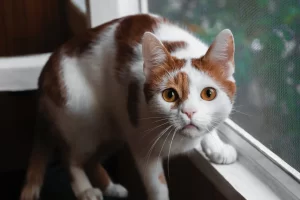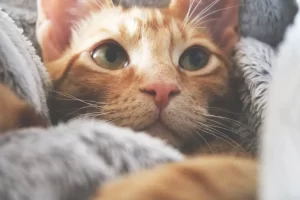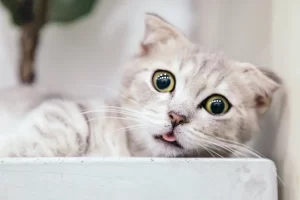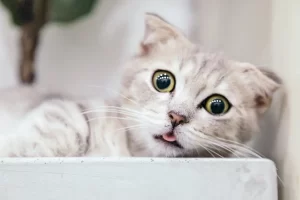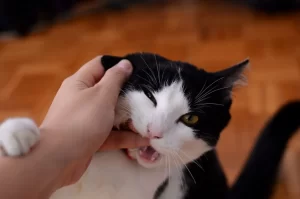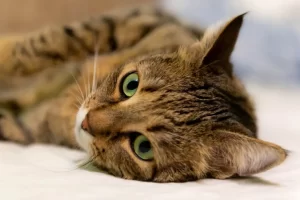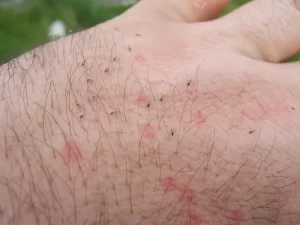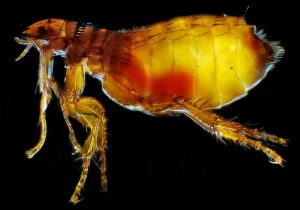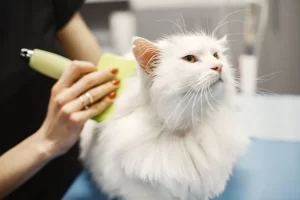Intestinal parasites are a common issue in cats and can cause serious health problems if left untreated. While chemical dewormers are widely available, many cat owners are opting for more natural solutions to deworm their pets. In this article, we’ll be exploring the topic of naturally deworming cats, covering everything from understanding different types of intestinal parasites, the dangers and risks associated with worms, and the most common natural remedies and treatments used for deworming cats. We’ll also be discussing the use of herbs, essential oils, and probiotics, and methods for preventing parasite infestations. With the right information and approach, you can help keep your cat healthy and free of parasites, naturally.
If you prefer to listen on-the-go, be sure to check out the audio version of this blog below!
Table of Contents
ToggleWhat is a cat worm?
“Cat worm” refers to a type of parasitic worm that can infect the digestive tract of cats. Cat worms can cause health problems and are commonly classified into four main types: roundworms, tapeworms, hookworms, and whipworms. Each type of worm has different life cycles, symptoms, and modes of transmission, and can be diagnosed through a variety of tests, including fecal exams. Effective treatment and preventive measures, such as regular deworming and good hygiene practices, are crucial in keeping cats healthy and parasite-free.
Different types of intestinal parasites in cats
Intestinal parasites are a common health issue in cats and can cause a range of symptoms if left untreated. Understanding the different types of intestinal parasites in cats is important for preventing and treating infestations.
- Roundworms: Roundworms are the most common type of parasite in cats. They have a life cycle that involves the ingestion of roundworm eggs by the cat, which then hatch into larvae in the digestive tract and mature into adult worms. Roundworms can cause symptoms such as diarrhea, abdominal swelling, and vomiting. They can be transmitted from mother cats to their kittens, or through ingestion of contaminated soil or prey. Roundworms can be diagnosed through a fecal exam, where a sample of the cat’s feces is analyzed for evidence of the parasites.
- Tapeworms: Tapeworms are another common type of parasite in cats. They have a life cycle that involves the ingestion of infected fleas or small rodents, which then release tapeworm larvae into the cat’s digestive system. Tapeworms can cause symptoms such as weight loss, abdominal discomfort, and an increased appetite. They are easily diagnosed through the observation of tapeworm segments in the cat’s feces. Note that fleas are not the only reason for tapeworms in cats.
- Hookworms: Hookworms are small, thin worms that feed on the cat’s blood and attach to the intestinal wall. They have a life cycle that involves the ingestion of larvae found in contaminated soil or through skin penetration. Hookworms can cause symptoms such as anemia, weight loss, and diarrhea. They can be diagnosed through a fecal exam or a blood test to assess for anemia.
- Whipworms: Whipworms are thin worms that live in the large intestine and feed on the cat’s intestinal contents. They have a life cycle that involves the ingestion of whipworm eggs, which then hatch into larvae in the cat’s digestive system. Whipworms can cause symptoms such as diarrhea, weight loss, and abdominal pain. They can be diagnosed through a thorough examination of the cat’s feces.
It is important to note that regular check-ups with a veterinarian and appropriate parasite control measures, such as regular deworming and good hygiene practices, can help keep cats healthy and parasite-free.
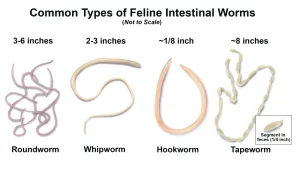
Health risks associated with worms
Intestinal parasites, or worms, can pose significant health risks to cats if left untreated. The following are some of the potential dangers, complications, and health risks associated with worms:
- Malnutrition: Worms can compete with the cat for nutrients, leading to malnutrition and weight loss. This can also weaken the cat’s immune system and make it more susceptible to other health problems.
- Anemia: Hookworms, in particular, feed on the cat’s blood, leading to anemia and a decrease in red blood cells. This can result in weakness, fatigue, and pale gums.
- Intestinal blockages: Large numbers of worms can cause blockages in the digestive tract, leading to abdominal pain, vomiting, and constipation.
- Toxicity: Some types of worms can produce toxins that can lead to liver damage, kidney damage, and other health problems.
- Spread to humans: Some types of worms, such as roundworms, can be transmitted to humans through contact with contaminated soil or feces. This can cause a range of health problems, including eye and skin infections.
- Reduced quality of life: The presence of worms can cause discomfort and pain for the infected cat, reducing its quality of life.
It is important to note that early detection and treatment of worm infestations can help prevent the development of these potential dangers, complications, and health risks.
Recognizing a parasite infestation in cats
Identifying the signs of a parasite infestation in cats can be challenging, as some cats may show no symptoms at all. However, some common signs of parasitic infection include:
- Diarrhea: Parasites, such as roundworms and tapeworms, can cause diarrhea in cats. The feces may also contain visible worm segments.
- Vomiting: Some types of parasites, such as tapeworms, can cause vomiting in cats. The vomit may contain visible worm segments.
- Weight loss: Parasites can consume the nutrients in a cat’s diet, leading to weight loss.
- Dull coat: Parasites can affect a cat’s overall health, leading to a dull coat and lack of energy.
- Anemia: Some types of parasites, such as hookworms, can cause anemia by feeding on a cat’s blood. This can result in pale gums and lethargy.
- Scooting: Tapeworms can cause itching and discomfort around a cat’s rectum, leading to scooting or rubbing the area on the ground. Follow these home remedies to prevent cats from scooting.
- Abdominal swelling: Parasites, such as roundworms, can cause abdominal swelling as they grow and multiply in the intestine.
If you suspect your cat has a parasite infestation, it is important to contact your veterinarian for a proper diagnosis.
Natural remedies to deworm cats
There are several natural remedies and treatments that can be used to help prevent or treat worm infestations in cats, including:
- Garlic: Garlic is believed to have antiparasitic properties and is often added to cat food as a natural dewormer. To use garlic as a natural remedy, it can be chopped and added to the cat’s food, or given in supplement form. However, it is important to note that large amounts of garlic can be toxic to cats and should be used with caution.
- Pumpkin seeds: Pumpkin seeds are believed to have antiparasitic properties and can be used as a natural dewormer. To use pumpkin seeds, they can be ground and sprinkled on the cat’s food or given in supplement form.
- Papaya: Papaya contains an enzyme called papain that is believed to have antiparasitic properties. To use papaya as a natural remedy, it can be mashed and added to the cat’s food or given in supplement form.
- Apple cider vinegar: Apple cider vinegar is believed to have antiparasitic properties and can be added to the cat’s drinking water to help prevent infestations. To use apple cider vinegar as a natural remedy, it can be mixed with the cat’s drinking water at a ratio of 1 tablespoon per 8 ounces of water.
- Diatomaceous earth: Diatomaceous earth is a naturally occurring substance that is believed to have antiparasitic properties. To use diatomaceous earth as a natural remedy, it can be sprinkled on the cat’s food or added to the cat’s bedding.
- Turmeric: Turmeric has antimicrobial and anti-inflammatory properties and can be used as a natural dewormer. To use turmeric, it can be added to the cat’s food or given in supplement form.
It is worth noting that while these natural remedies and treatments can be effective in reducing the number of worms in the digestive tract, they should not be used as a substitute for veterinary care and prescription dewormers.
Herbal remedies to deworm cats
Herbs can be used as natural remedies to help prevent or treat worm infestations in cats. Some of the most commonly used herbs for deworming include thyme, wormwood, and fennel:
- Thyme: Thyme has antimicrobial properties and is often used as a natural dewormer. To use thyme can be dried and added to the cat’s food or given in supplement form.
- Wormwood: Wormwood has antiparasitic properties and is often used as a natural dewormer. To use wormwood can be dried and added to the cat’s food or given in supplement form.
- Fennel: Fennel is believed to have antiparasitic properties and is often used as a natural dewormer. To use fennel can be dried and added to the cat’s food or given in supplement form.
- Neem: Neem is a tree native to India and has antiparasitic properties. To use neem, can be added to the cat’s food or given in supplement form, or applied topically to the skin.
Remember that while these herbs can be effective in reducing the number of worms in the digestive tract, they should not be used as a substitute for veterinary care and prescription dewormers.
Probiotics for parasite prevention and treatment in cats
Probiotics can be a beneficial tool in preventing and treating parasite infestations in cats. Probiotics contain beneficial bacteria that help maintain a healthy balance of gut microbes, which can help prevent and reduce the severity of infestations.
Here is a list of some probiotics that may be beneficial for cats:
- Lactobacillus acidophilus: This type of bacteria is commonly found in the gut and can help prevent the growth of harmful bacteria, including parasites.
- Bifidobacterium bifidum: This type of bacteria can help support a healthy gut and boost the immune system.
- Enterococcus faecium: This type of bacteria can help maintain a healthy gut and support the immune system.
To use probiotics, they can be given to the cat in supplement form or added to their food. It is important to consult with a veterinarian to determine the best type of probiotic and appropriate dosage for the cat.
Note that while probiotics can be a beneficial tool in preventing and treating parasite infestations, they should not be used as a substitute for veterinary care and prescription dewormers.
Essential oils for cat deworming
Essential oils, such as clove and eucalyptus, have antimicrobial properties and can be used as part of a natural deworming program for cats. However, it is important to note that essential oils should be used with caution as they can be toxic to cats if used improperly.
Here are some essential oils that may be used for deworming cats:
- Clove: Clove oil has antimicrobial properties and may be used to help reduce the number of parasites in the digestive tract. To use clove oil, it can be added to the cat’s food in small amounts or applied topically to the skin.
- Eucalyptus: Eucalyptus oil has antiparasitic properties and may be used to help reduce the number of parasites in the digestive tract. To use eucalyptus oil, it can be added to the cat’s food in small amounts or applied topically to the skin.
- Cinnamon: Cinnamon oil has antimicrobial properties and may be used to help reduce the number of parasites in the digestive tract. To use cinnamon oil, it can be added to the cat’s food in small amounts or applied topically to the skin.
- Oregano: Oregano oil has antiparasitic properties and may be used to help reduce the number of parasites in the digestive tract. To use oregano oil, it can be added to the cat’s food in small amounts or applied topically to the skin.
- Lemon: Lemon oil has antibacterial and antifungal properties and may be used to help reduce the number of parasites in the digestive tract. To use lemon oil, it can be added to the cat’s food in small amounts or applied topically to the skin.
It is important to always dilute essential oils before use and to consult with a veterinarian before using essential oils as a deworming treatment. Some cats may have a sensitivity or an allergy to certain essential oils, and using them improperly can lead to toxicity and other health problems.
How to introduce natural dewormers into a cat’s diet
Here are some steps to follow when introducing natural dewormers into a cat’s diet:
- Start small: When introducing a new food or supplement, it is best to start with a small amount and gradually increase over time. This can help your cat adjust to the new food and reduce the risk of digestive upset.
- Mix with food: Mixing natural dewormers with your cat’s food can help make the transition smoother. You can add a small amount of the dewormer to your cat’s regular food and gradually increase the amount over time.
- Offer a variety: Offering a variety of natural dewormers, such as herbs, essential oils, and probiotics, can help keep your cat’s diet interesting and provide a range of beneficial compounds.
- Watch for signs of discomfort: Keep an eye on your cat’s behavior and look for any signs of discomfort or digestive upset. If you notice any changes, reduce the amount of the natural dewormer you are offering or discontinue use.
- Consult with a veterinarian: A veterinarian can help you determine the right amount and frequency of natural dewormers for your cat, based on their individual needs and health status. They can also advise on any potential interactions or adverse effects that may occur.
Chemical dewormers and their side effects
Chemical dewormers, also known as prescription dewormers, are medications used to treat and prevent parasitic infections in cats. These medications are typically available through a veterinarian and are used in conjunction with good hygiene practices to prevent the spread of parasites.
Here is a list of commonly used chemical dewormers for cats, along with details and instructions for use:
- Praziquantel: This medication is used to treat tapeworm infections in cats. It is typically given as a single dose, either orally or by injection, and is well tolerated by most cats.
- Fenbendazole: This medication is used to treat roundworms, hookworms, and some types of tapeworms in cats. It is usually given as a single dose, either orally or by injection, and is well tolerated by most cats.
- Milbemycin oxime: This medication is used to treat heartworm disease, as well as some types of roundworms, hookworms, and whipworms in cats. It is typically given once a month as a topical treatment or an oral medication.
- Emodepside/praziquantel: This combination medication is used to treat tapeworm and roundworm infections in cats. It is typically given as a single dose, either orally or by injection, and is well tolerated by most cats.
- Ivermectin: This medication is used to treat a variety of parasitic infections, including heartworm disease, roundworms, and mites in cats. It is usually given as a topical treatment or an oral medication.
Always follow the dosing instructions provided by a veterinarian, as overuse or inappropriate use of chemical dewormers can lead to toxicity and other adverse effects. Some common side effects of chemical dewormers include vomiting, diarrhea, loss of appetite, and lethargy. If you notice any signs of adverse effects after administering a dewormer, it is important to contact your veterinarian for guidance.
Additionally, chemical dewormers should not be used as a substitute for good hygiene practices, such as regular hand washing and cleaning litter boxes, in preventing the spread of parasites. Chemical dewormers are only one part of an overall parasite control plan and should be used in conjunction with other preventive measures, such as regular veterinary check-ups and parasite testing.
How to prevent parasite infestations in cats
Preventing parasite infestations in cats is important to maintain their health and well-being. Some methods and recommendations for preventing parasites in cats include:
- Regular deworming: Schedule regular deworming with your veterinarian, especially for kittens and cats that spend time outdoors.
- Good hygiene: Keep your cat’s litter box clean and dispose of their feces properly to prevent the spread of parasites. Wash your hands thoroughly after handling litter or feces.
- Flea control: Fleas can carry tapeworm larvae, so controlling fleas on your cat is important to prevent tapeworm infestations.
- Avoid contaminated food: Don’t feed your cat raw or undercooked meat, as it can contain parasite larvae.
- Keep indoor cats indoors: Outdoor cats are at a higher risk of exposure to parasites, so keeping indoor cats indoors can reduce their risk.
- Limit exposure to wildlife: If you have outdoor cats, limit their exposure to wildlife, such as rodents, which can carry parasites.
- Keep food and water dishes clean: Wash your cat’s food and water dishes regularly to prevent the buildup of parasites.
- Maintain good nutrition: Feed your cat a balanced, nutritionally complete diet to maintain their overall health and prevent parasite infestations.
- Avoid overcrowding: Overcrowding can increase the risk of parasite transmission, so limit the number of cats in a single household.
Natural supplements and vitamins for feline immune support
The role of natural supplements and vitamins in supporting a cat’s immune system is important in preventing parasite infestations. Some natural supplements and vitamins that can support a cat’s immune system include:
- Vitamin C: Vitamin C is an antioxidant that helps support a cat’s immune system and may also have antiparasitic properties.
- Omega-3 fatty acids: Omega-3 fatty acids found in fish oil can help support a cat’s immune system and may also have antiparasitic properties.
- Probiotics: Probiotics can help maintain a healthy gut and support a cat’s immune system, reducing the risk of parasite infestations.
- Zinc: Zinc is essential for a healthy immune system and may also have antiparasitic properties.
- Vitamin E: Vitamin E is an antioxidant that helps support a cat’s immune system and may also have antiparasitic properties.
- Garlic: Garlic has antimicrobial and antiparasitic properties and may help support a cat’s immune system.
Recommended diets for cats with parasite infestations
A balanced and nutritious diet can help support a cat’s immune system and reduce the risk of parasite infestations. Some recommended diets for preventing and treating parasite infestations in cats include:
- High-protein diet: Feeding your cat a high-protein diet, such as one based on animal proteins like chicken, fish, or beef, can help support their immune system and reduce the risk of parasite infestations.
- Grain-free diet: A grain-free diet can help reduce the risk of parasites, as grains can be a source of infestations.
- Raw food diet: A raw food diet, also known as a “BARF” diet (biologically appropriate raw food), can provide all the nutrients your cat needs to support their immune system and reduce the risk of parasite infestations.
- Homemade diet: A homemade diet made from fresh, whole ingredients can provide all the nutrients your cat needs to support their immune system and reduce the risk of parasite infestations.
- Limited ingredient diet: A limited ingredient diet that contains a single protein source and a limited number of ingredients can help reduce the risk of parasite infestations, especially for cats with food sensitivities.
Which vet to visit with what expertise
If you suspect that your cat has a parasite infestation or if you want to discuss preventive measures, it’s recommended to visit a veterinarian who has expertise in feline health. Some common veterinary specialists who can help with parasite infestations in cats include:
- General Practitioner: A general practitioner (GP) veterinarian is a good starting point for routine check-ups and general health concerns, including parasite infestations.
- Internal Medicine Specialist: An internal medicine specialist has advanced training in the diagnosis and treatment of diseases affecting the internal organs, including parasite infestations.
- Parasitologist: A parasitologist is a veterinary specialist who focuses on the study and treatment of parasites, including those that affect cats.
- Dermatologist: A dermatologist specializes in the diagnosis and treatment of skin and coat problems, including parasite infestations that affect the skin.
Your veterinarian can recommend the best course of action for your cat, including the type of specialist that is best suited to your cat’s needs and the specific type of parasite infestation.
Read more on How often should I take my cat to the vet?



